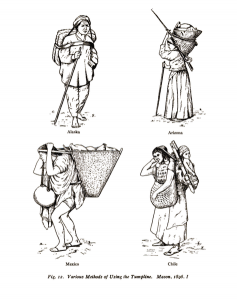This topic has received magisterial treatment (in the scholarly sense) in Gary Anderson’s book, Sin: A History, but I wanted to offer a brief post on the biblical metaphors for sin. I find them fascinating and life-changing in terms of the way we conceive of ourselves and our moral mis-steps.
1. A Burden

Anderson insists that the concept of sin as a burden in the OT is the most important, foundational metaphor. For example, we find “a people laden with iniquity” (Isa 1:4), the idea of “bearing sin” (Lev 20:20, 22:9, 24:15; Num 9:13, 18:22, 32), and iniquities “like a heavy burden” (Ps 38:4). But also Jesus says “Come to me all you who are weary and heavy-laden, and I will give you rest” (Matt 11:28). So sin is a burden to be borne.
2. A Stain
Anderson emphasizes this idea, which shows up in Jer 2:22 as “the stain of your guilt,” but also in Isaiah 1:18 “though your sins be like scarlet, they shall be white as snow.” There’s also the possibility of a “spot” clinging to Job’s hands (Job 31:7). The idea shows up elsewhere too (Sir 11:33, 44:19; 1 Tim 6:14). Sin is like a stain that is really hard to wash out. So redemption then is a “cleansing” or a “washing” (Ps 51:4; Eph 5:26; Titus 3:5).
3. A Debt
Sin is mentioned as a “record of debt” that was nailed to the cross by St. Paul (Col 2:14). Jesus uses the idea of debt to explain the forgiveness of sins in parables (Matt 18:21-35; Luke 7:41-50). It’s important to note that sometimes in the ancient world people would literally “sell themselves” into slavery in order to pay back debts, so these two metaphors for sin are connected. It gives a whole new meaning to the term “Master Card.”
4. A Lion

One of the first mentions of sin is in Genesis 4:7 where it is “crouching at the door” hoping to devour Cain. The posture of crouching is specifically linked with lions in the OT (Gen 49:9; Num 24:9; Deut 33:20; Job 38:40; Ezek 19:2). This idea re-appears in 1 Pet 5:8 as the devil “prowling around like a roaring lion, seeking someone to devour.” So sin is a lion: Look out!
5. Leprosy
Leprosy, a skin disease, made a person ritually unclean and unable to enter the Temple and in fact, had to live in exile separated from other people (see Lev 13-14). The connection between sin and leprosy is not as explicit in the Bible, but both of them make a person “unclean” and therefore unfit for God’s presence. Two famous lepers appear in the OT: Naaman the Syrian (2 Kgs 5:1), and King Azariah/Uzziah (2 Kgs 15:5; 2 Chr 26:21-23). Notably, one is delivered by God from leprosy and the other is afflicted by God with the disease. When Jesus cleanses lepers (Mark 1:41 || Matt 8:3, Luke 17:14, Matt 11:5 || Luke 7:22), he is not only healing them physically, but symbolically pointing to his power to forgive sins. Notably, the ten lepers cry out for him to “have mercy on us” (Luke 17:13). He does. So sin is like a debilitating skin disease which makes a person unclean, unable to enter the presence of the Lord.
6. Slavery
Slavery links sin to the Israelites’ plight in Egypt. This particular situation of slavery is the controlling one for biblical metaphor here (just search “house of slavery” in the OT), but slavery in general is linked to sin. This concept is mentioned in Heb 2:15, which mentions the “lifelong slavery” of sin by which we were enslaved to the devil. St. Paul mentions the “spirit of slavery” (Rom 8:15) and the “yoke of slavery” (Gal 5:1; see also Gal 2:4). In Galatians, he’s more specifically talking about slavery to the ceremonial precepts of the Mosaic law, but the main idea is that Christ has freed us from slavery to sin and some would have us go back into slavery.
7. Slavemaster
St. Paul tells us that it is possible to be “enslaved to sin” (Rom 6:6), portraying Sin as a slavemaster. I like to think of this very similar to the way drug addiction works–one can become enslaved to drugs or alcohol. Sin has the same allure, but induces a person into subservience, sacrificing their free will to feed their destructive desires.
8. King
According to St. Paul, sin used to “reign through death” (Rom 5:21) and he urges us not to allow sin to “reign in your mortal body” (Rom 6:12). Also, much earlier, God urges Cain to “rule over” sin which “desires” him (Gen 4:7). Sin can be a king or we can be king over it.
9. Military Conscriptor
St. Paul talks about how one who succumbs to sin makes his body parts “weapons for unrighteousness” (Rom 6:13). Also, he describes how the “wages”–the Greek word ὀψώνια originally referred to a soldier’s pay–“of sin is death” (Rom 6:23). So, the army-pay of sin is death and the one who pays it is Sin, who makes our bodies into “weapons” for his evil designs.
There you have it. Sin, fundamentally a choice against God, an act of disobedience, is pictured many different ways throughout the Bible. The Bible portrays sin as a burden, a stain, a debt, a lion, leprosy, slavery, a slavemaster, a king and a military conscriptor. If you find any more metaphors for sin in the Bible, leave a comment.


